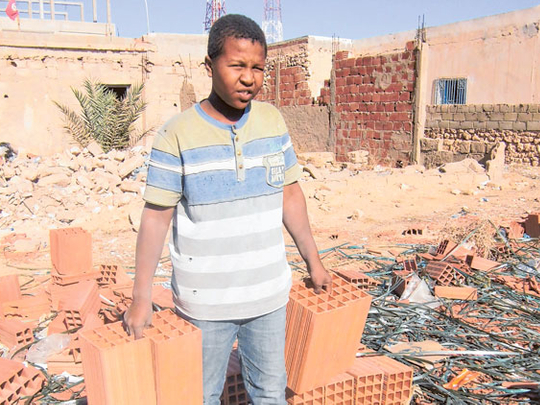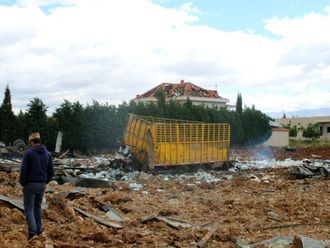
Tunis: Despite the post-revolution era triumph, thousands of Tunisian children are born to live under the breadline with their families facing hard and dying living conditions. Children are unfortunately obliged to be subject to work in dangerous jobs that may threaten their health as well as their future life. Being deprived of their human and natural rights, children hold a lot of pressures on their shoulders, do not get the opportunity to carry on school and grow up to work in poorly-paid jobs.
Tarek, 14 years -old Tunisian boy, who dropped out of school 3 years ago under his parent’s pressure and desire, said with a voice full of regrets and eyes of dreams:” when life turns its back on me, I must sacrifice to survive”. Overworked, Tarek challenges his young age and small body to” move out building materials from trucks in order to help [his] poor family”. He went on to put an end to this unbearable situation; he is looking for another more comfortable job as soon as possible, “for this moment, I have no other choice”.
This working child has never wanted to leave his school at an early age; however, his unemployed- ill father sent him to work in order to help and alter the family’s situation, “I had always dreamt of becoming a teacher, I had believed that if I ended up my schools, my dreams would have being realized and I would have bought a very big house where we could all live in”.
Every morning, Tarek hugs his mother and says “mum, please don’t forget to pray for me”. These heart touching words mirrors the child’s hard journey in his life’s battle and his commitment to assume hard responsibilities and to earn even his little fortune. He spends 12 hours a day moving heavy building materials to earn 10 Tunisian Dinars a day (25 AED) from which he spends 3 dinars (10 AED) to have lunch and pay transportation fees. Wishing to get rid of his job, Tarek doesn’t feel at ease with his employer,” he is always angry and never smiles”. With mixed and confused feelings of sigh and sorrow, Tarek, desperately, watches his friends going and coming back from school. “I miss to my friends, my teachers and even to the schoolyard, where we used to play and have fun”. Tarek says with an optimistic tone “Even though I stopped my study, I will do my best to make my teachers feel proud of me”.
He believes that it is his fate to give up playing and studying, his family’s situation pushed him to forget about them and see life “from another serious perspective”.
Tarek was never and will never be the only suffering working child in Tunisia, children just find themselves forced to give away their innocent dreams and take part – unwillingly- in a real dreadful “ jungle” called “ adults’ life” .
In a country where education is free and compulsory, child labor in Tunisia remains a bitter reality, a social controversy and a crime against humanity. Hundreds of children are still found in fields, factories, street corners, in sidewalk cafés, shopping centers, garbage dumps and in private houses.
Many families violate the law and push their children to work in order to earn some money and gain self-confidence together with self-responsibility.
According to a report issued in 2012 by the Tunisian statistic center, more than 6,900 of Tunisian children are laborers, and they are struggling miserable living conditions and threatened to be economically and sexually abused. In fact, two years after the revolution, the phenomenon has been exacerbated and children rights have been more and more marginalized.
Aida Ghorbal, the Ministry’s General Director for the Protection of Children said that this situation necessitates a great focus on children’s rights that should be preserved and respected .She insisted that children’s rights must be included in the new constitution which may cure the high rate of working children. Ghorbal went on to add that constitutionalizing these rights will be” a historic opportunity “and make their right privileged, also it will have a positive effects on the next future programs.
Recently, the UNICEF Representative in Tunisia Maria Luisa Fornana , who has signed the international convention on rights of the child including Tunisia, said that the new Tunisian constitution must implement measures to improve and guarantee the social services, medical health care and child-friendly justice.
Sarah Dabbar is a journalist based in Tunisia











